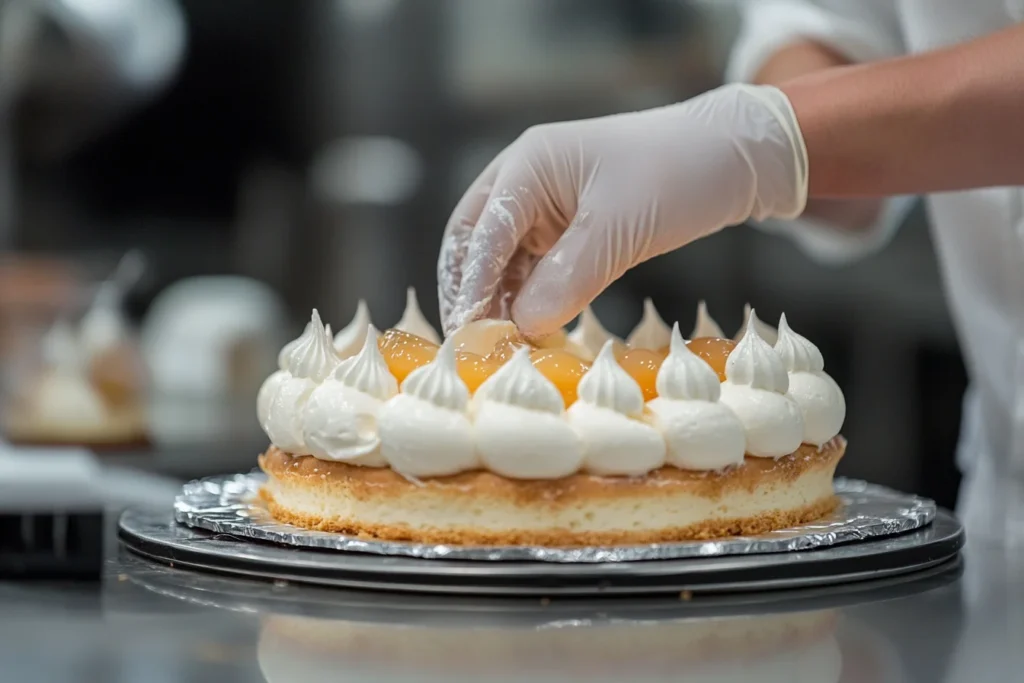How to Become a Dessert Chef? Embarking on a journey to become a dessert chef combines passion, creativity, and precision. This comprehensive guide outlines the steps to transform your culinary dreams into reality.
Table of Contents
Understanding the Role of a Dessert Chef
A dessert chef, also known as a pastry chef or pâtissier, specializes in creating a variety of desserts, pastries, breads, and other baked goods. Their responsibilities extend far beyond simply baking cookies or cakes; they are artists in their own right, transforming simple ingredients into visually stunning and delectable creations. The role of a dessert chef is not only crucial to the success of a restaurant or bakery but also demands a unique blend of skills, creativity, and dedication.
Key Responsibilities of a Dessert Chef
- Designing Dessert Menus: Crafting innovative and appealing dessert options that complement the main menu and appeal to a variety of customers. This includes seasonal offerings and catering to dietary restrictions.
- Preparing Baked Goods: Baking items such as cakes, pastries, breads, and tarts with attention to detail and quality. Each item must be perfect in taste, texture, and presentation.
- Decorating Desserts: Applying artistic skills to enhance the visual appeal of desserts. Garnishing, glazing, and creative plating are crucial to making desserts irresistible.
- Managing Kitchen Operations: Overseeing the pastry section, including inventory management, purchasing ingredients, ensuring food safety standards, and supervising junior staff. Maintaining the correct stock levels of ingredients and managing costs efficiently is critical to a successful kitchen.
- Experimentation and Innovation: Constantly experimenting with new recipes, techniques, and ingredients to create unique and memorable desserts.
Pastry chefs are responsible for providing the perfect ending to a meal, and their work directly impacts customer satisfaction. This is why becoming a dessert chef requires both passion and a willingness to dedicate oneself to continuous improvement.
How to Become a Dessert Chef? Steps to Becoming a Dessert Chef

1. Cultivate a Passion for Baking
The journey to becoming a dessert chef starts with an innate passion for baking. This passion can often be found at a young age, experimenting with baking recipes in the family kitchen or watching cooking shows. Cultivating this passion is crucial because it drives you to overcome the challenges you may encounter in your culinary journey.
- Start at Home: Begin by experimenting with simple recipes at home, like cookies, cupcakes, and simple cakes. This will help you develop an understanding of baking fundamentals.
- Read and Learn: Read baking books, watch tutorials, and immerse yourself in the world of desserts. Understanding the science behind baking—why certain ingredients react in particular ways—will deepen your appreciation and skill.
- Learn from Mistakes: Mistakes are an important part of the learning process. Every failed cake or burnt cookie is an opportunity to learn what went wrong and how to correct it.
2. Obtain Formal Education
While you can learn a great deal on your own, formal education is often the foundation for a successful career as a dessert chef. Enrolling in a reputable culinary school provides the knowledge and experience needed to excel in the pastry arts.
Benefits of Formal Culinary Education
- Structured Learning: Culinary schools provide a structured curriculum that covers all aspects of pastry arts, from basic baking to advanced dessert preparation.
- Hands-on Experience: Culinary programs include practical classes where students get the chance to practice their skills under the guidance of experienced chefs.
- Industry Standards: Formal education teaches students about food safety, hygiene standards, and the protocols of running a professional kitchen.
Institutions such as Le Cordon Bleu offer renowned pastry programs that help students acquire the skills needed to thrive in the industry.
Choosing the Right Culinary School
Selecting a culinary school can be a critical decision. Consider factors such as the program’s reputation, faculty expertise, hands-on training opportunities, and the school’s connections within the culinary industry.
- Program Specialization: Choose a program that specializes in pastry arts rather than general culinary studies.
- Class Size: Smaller classes can provide more personalized attention from instructors.
- Cost and Financial Aid: Culinary school can be expensive, so check if the school offers scholarships or financial aid options.
3. Gain Practical Experience
After obtaining formal education, gaining practical experience is the next crucial step. Real-world experience in a professional kitchen is invaluable in understanding the dynamics and demands of the industry.
Internship Opportunities

- Restaurants and Hotels: Many restaurants and hotels offer internship opportunities where you can learn on the job. The experience gained in a busy kitchen environment is indispensable.
- Bakeries and Patisseries: Working in a bakery helps you hone your skills in bread making, cake decorating, and pastry creation.
- Apprenticeships: Some renowned chefs and establishments offer apprenticeship programs where you can learn directly from a mentor.
Internships provide an opportunity to apply learned skills, learn new techniques, and understand the workflow of a professional kitchen. They also help you build your professional network, which is crucial for future career growth.
4. Develop Essential Skills
The success of a dessert chef depends not only on technical proficiency but also on other essential skills that contribute to overall performance and leadership in the kitchen.
Creativity and Innovation
Desserts are as much about aesthetics as they are about taste. A successful dessert chef must constantly innovate to create unique and visually stunning desserts. Creativity can be nurtured by staying informed about the latest trends, experimenting with different flavors and textures, and even traveling to experience diverse culinary traditions.
Attention to Detail
Desserts require precision in measurement and technique. Small variations can significantly impact the texture, taste, or appearance of the final product. A dessert chef must be meticulous in every aspect of their work, from measuring ingredients to final decoration.
Time Management
A professional kitchen is a fast-paced environment, and being able to work efficiently under pressure is crucial. Dessert chefs often work with tight schedules, preparing multiple items simultaneously while maintaining quality and presentation.
Leadership and Teamwork
As a pastry chef, you may be required to lead a team. Leadership involves training junior staff, managing workloads, and ensuring consistency in production. Good communication skills are essential to work cohesively with other sections of the kitchen.
5. Pursue Certifications
Certifications can help enhance your credibility as a dessert chef and make you more marketable to employers. They serve as a validation of your skills and knowledge in pastry arts.
Important Certifications for Dessert Chefs
- Certified Pastry Culinarian (CPC): Offered by the American Culinary Federation, this certification demonstrates a pastry chef’s skills and commitment to the profession.
- ServSafe Certification: This is a food safety certification that is essential for working in the culinary industry. It shows that you understand food safety practices, which is a critical aspect of any kitchen.
These certifications can provide an edge when applying for jobs, especially in highly competitive environments.
6. Continue Learning and Stay Updated
The culinary industry is dynamic, with new trends, techniques, and ingredients emerging constantly. Continuous learning is essential to keep your skills sharp and your desserts relevant to current tastes.
- Workshops and Seminars: Attending workshops conducted by renowned chefs can help you learn advanced techniques and stay updated with current trends.
- Online Courses: Platforms like Udemy and Skillshare offer courses in advanced pastry techniques, cake decorating, and other skills that are useful for dessert chefs.
- Networking and Associations: Join culinary associations like the American Culinary Federation (ACF). Being a part of these communities can provide networking opportunities and help you learn from industry peers.
Career Opportunities for Dessert Chefs
1. Restaurant Pastry Chef
Many high-end restaurants employ a dedicated pastry chef to handle all dessert preparations. In this role, you are responsible for designing a dessert menu that complements the restaurant’s offerings and overseeing the execution of those desserts to perfection.
Key Aspects of Being a Restaurant Pastry Chef
- Collaboration with Head Chefs: Working closely with the head chef to ensure that desserts align with the overall menu concept.
- Seasonal Offerings: Creating desserts that reflect the changing seasons and incorporate fresh, seasonal ingredients.
- Customer Feedback: Paying attention to customer preferences and feedback to continuously improve dessert offerings.
2. Bakery or Patisserie Owner
If you dream of owning your own bakery, becoming a dessert chef is a natural step towards realizing that goal. Owning a bakery allows you to have complete creative control over the items you produce and gives you the freedom to experiment with different flavors and concepts.
Tips for Opening Your Bakery
- Business Plan: Develop a detailed business plan that outlines your target market, pricing strategy, and operational details.
- Location: Choose a location with high foot traffic, such as near a busy shopping area or a residential neighborhood.
- Menu Development: Start with a focused menu of specialty items that set you apart from competitors. Gradually expand as your customer base grows.
- Branding and Marketing: Use social media platforms like Instagram and Facebook to promote your bakery. High-quality images of your desserts can attract more customers.
3. Caterer or Event Pastry Chef
Another potential career path is working as a pastry chef for a catering company or as a freelance event chef. In this role, you create desserts for special events such as weddings, corporate events, and parties.
Special Considerations for Event Pastry Chefs
- Customization: Clients often have specific requests for customized desserts, such as themed cakes or dessert tables that match the event’s decor.
- Logistics: Transporting desserts requires careful planning to ensure they arrive in perfect condition. Invest in proper equipment to maintain temperature and prevent damage during transport.
- Flexibility: Event catering can require irregular hours, and you need to be flexible with your schedule to accommodate the demands of the job.
4. Food Stylist or Consultant
Dessert chefs can also pursue careers outside of the kitchen. As a food stylist, you can work in the media industry, preparing desserts for photoshoots, advertisements, and TV shows. Alternatively, working as a consultant for restaurants or bakeries allows you to guide other chefs and business owners in developing their dessert menus and improving their pastry sections.
Skills Required for Food Styling
- Visual Presentation: Understanding how to arrange desserts in an aesthetically pleasing manner for the camera.
- Knowledge of Props and Equipment: Using tools and props to create the ideal setup for photographing desserts.
- Collaborative Skills: Working with photographers, designers, and clients to bring the vision of the dessert to life.
5. Culinary Instructor
With experience and expertise, you may choose to share your knowledge by becoming a culinary instructor. Teaching allows you to inspire the next generation of dessert chefs while keeping your skills sharp.
Requirements for Becoming an Instructor
- Experience: Typically, several years of industry experience are required before transitioning into a teaching role.
- Communication Skills: The ability to clearly explain techniques and concepts is essential for teaching.
- Curriculum Development: Developing lesson plans and ensuring students receive a well-rounded education in pastry arts.
Frequently Asked Questions
How to Be a Dessert Chef?
To become a dessert chef, start with a passion for baking, pursue formal education in pastry arts, gain practical experience, develop essential skills, obtain relevant certifications, and commit to continuous learning. It’s a career that requires both creativity and dedication.
What Questions Are Asked in a Pastry Chef Interview?
Common interview questions for a pastry chef position may include:
- Can you describe your experience with various baking techniques?: Interviewers want to understand the breadth of your skills and your familiarity with different pastry techniques.
- How do you ensure consistency and quality in your desserts?: Consistency is key in baking, and employers need to know how you maintain quality even under pressure.
- How do you stay updated with current pastry trends?: Employers are often interested in how chefs keep themselves informed about new flavors, techniques, and trends.
- Can you provide examples of how you’ve handled challenges in the kitchen?: Situations like equipment failure, ingredient shortages, or difficult clients can test your abilities. Be prepared with examples of how you have successfully navigated such challenges.
What Is the Job of a Dessert Chef?
A dessert chef is responsible for designing dessert menus, preparing and decorating desserts, managing the pastry section, and ensuring high standards of quality and presentation. They also need to innovate and keep up with evolving food trends to provide guests with a memorable experience.
What’s the Dessert Chef Called?
A dessert chef is commonly referred to as a pastry chef or pâtissier. They specialize in creating all kinds of desserts, pastries, and baked goods, contributing to the culinary world by adding a sweet note to the dining experience.
Embarking on a career as a dessert chef requires dedication, continuous learning, and a passion for the culinary arts. By following these steps, you can turn your passion for desserts into a rewarding profession.
Suggested Articles Links:


6 thoughts on “How to Become a Dessert Chef”